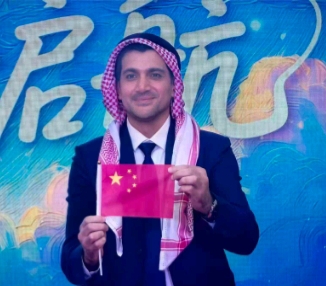
اجنادين نيوز / ANN
محمد حسين عبدالله
باحث وطالب ماجستير في الإدارة العامة في جامعة هواتشونغ للعلوم والتكنولوجيا (HUST)
عضوٌ في الاتحاد الدولي للصحفيين، والاعلاميين أصدقاء وحلفاء الصين- فرع الصين.
تلعب الصين اليوم دورًا عالميًا متعاظمًا في الجهود المبذولة نحو السياسة الحزبية والحوكمة العالمية، إذ برزت كقوة صاعدة تسهم في إعادة تشكيل النظام الدولي من خلال نموذجها السياسي القائم على قيادة مركزية قوية واستقرار طويل الأمد بعيدًا عن التقلبات الحزبية والصراعات الداخلية التي تعيق التنمية في العديد من الدول، وهو ما أتاح لها تحقيق إنجازات تنموية هائلة مثل القضاء على الفقر المدقع، وبناء نهضة صناعية وتكنولوجية كبرى، وتعزيز قدرتها على مواجهة التحديات الاقتصادية المعقدة. وعلى الصعيد العالمي، تواصل الصين دعم النظام متعدد الأطراف، والدعوة إلى إصلاح المؤسسات الدولية ليكون صوت الدول النامية أكثر حضورًا وتأثيرًا، إضافة إلى إطلاقها مبادرات استراتيجية ضخمة مثل “الحزام والطريق” التي تهدف إلى تعزيز الترابط التجاري والبنية التحتية بين القارات، بما يخلق شبكة تعاون دولي واسعة قائمة على المنفعة المتبادلة. كما تروج الصين لمفهوم “مجتمع المصير المشترك للبشرية” الذي يشجع على الوحدة الدولية للتعامل مع القضايا المشتركة كالتغير المناخي، والصحة العالمية، والأمن الغذائي، مع سعيها المتواصل للمساهمة في وضع معايير عالمية للذكاء الاصطناعي والأمن السيبراني والحوكمة الرقمية.
وفي هذا السياق العالمي المتجدد، تبرز العلاقة الصينية الأردنية كنموذج متقدم للتعاون الهادئ والمتوازن، خصوصًا في مجالات التنمية والبنية التحتية والطاقة. فقد انضم الأردن رسميًا إلى مبادرة “الحزام والطريق”، مما فتح الباب أمام مشاريع استثمارية واستراتيجية تدعم الاقتصاد الأردني وتساهم في تطوير قطاعاته الحيوية. كما عززت الصين دعمها للأردن عبر مشروعات في مجالات الطاقة المتجددة، وتكنولوجيا المعلومات، والتعليم، الأمر الذي جعل التعاون بين البلدين مثالًا ناجحًا على الشراكة القائمة على المنفعة المتبادلة دون اشتراطات سياسية، وبما ينسجم مع رؤى الأردن للتنمية المستدامة وتعزيز الأمن الاستراتيجي. وتُظهر العلاقات الثنائية كيف يمكن للدول النامية أن تستفيد من الصعود الصيني عبر منطلقات تقوم على التوازن، وتنوع الشراكات، واستثمار التحولات الدولية لبناء مستقبل أكثر استقرارًا وازدهارًا.
وبهذا، أصبحت الصين عنصرًا محوريًا في رسم مستقبل السياسة الحزبية والحوكمة العالمية، مقدمة نموذجًا جديدًا يقوم على الاستقرار والتخطيط الاستراتيجي والتعاون الدولي، مع تأثير متزايد يعيد تشكيل ملامح النظام العالمي في القرن الحادي والعشرين، وتنعكس آثاره الإيجابية على علاقات الصين مع شركائها ومن بينهم الأردن الذي وجد في هذا الصعود فرصة لتعزيز مساره التنموي وبناء شراكات متقدمة تخدم مصالحه الوطنية.
“China’s Role in the New World Order: Party Politics and Global Governance”
Mohammad Hussein Abdulla,
Researcher and Master’s student in Public Administration at Huazhong University of Science and Technology (HUST),
Member of the International Federation of Journalists and the Arab Writers Friends and Allies of China” Forum China Branch
China today plays an increasingly significant global role in the efforts toward party politics and global governance. It has emerged as a rising power contributing to the reshaping of the international order through its political model, which is based on strong centralized leadership and long-term stability, far from partisan fluctuations and internal conflicts that hinder development in many countries. This model has enabled China to achieve tremendous developmental accomplishments, such as eradicating extreme poverty, building a major industrial and technological renaissance, and strengthening its ability to confront complex economic challenges.
On the global stage, China continues to support a multilateral system and calls for reforming international institutions so that the voices of developing countries become more present and influential. It has also launched major strategic initiatives such as the Belt and Road Initiative, which aims to enhance trade connectivity and infrastructure across continents, creating a broad network of international cooperation based on mutual benefit. China also promotes the concept of a “community with a shared future for humanity,” which encourages international unity in addressing common issues such as climate change, global health, and food security, while it continues to contribute to establishing global standards for artificial intelligence, cybersecurity, and digital governance.
Within this renewed global context, the Chinese–Jordanian relationship stands out as an advanced model of calm and balanced cooperation, particularly in the fields of development, infrastructure, and energy. Jordan officially joined the Belt and Road Initiative, opening the door to strategic and investment projects that support the Jordanian economy and contribute to the development of its vital sectors.
China has also strengthened its support for Jordan through projects in renewable energy, information technology, and education, making the cooperation between the two countries a successful example of a partnership based on mutual benefit without political conditions in harmony with Jordan’s vision for sustainable development and the enhancement of strategic security. The bilateral relations demonstrate how developing countries can benefit from China’s rise through approaches based on balance, diversified partnerships, and leveraging international transformations to build a more stable and prosperous future.
Thus, China has become a pivotal element in shaping the future of party politics and global governance, offering a new model founded on stability, strategic planning, and international cooperation. Its growing influence is reshaping the features of the global system in the twenty-first century, with positive effects reflected in its relations with partners including Jordan, which has found in China’s rise an opportunity to strengthen its development path and build advanced partnerships that serve its national interests.





